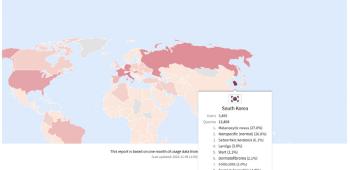Social isolation causing dementia and affect the development of brain function in adolescents
Aug 11, 2025
|
Professor Lee Jung-hee of the Department of Radiology at Samsung Medical Center, Professor Jung-kwon of the Department of Physiology and Medicine, and Lee Tae-kwan, a senior researcher at the Korea Brain Research Institute, published in the recent issue of the international journal Nature Communications.
The research team divided male mice aged 4 to 11 weeks into two groups and raised them in environments rich in physical stimulation and social exchange such as tunnels, rotating wheels, and nests, and in social isolation, where they are raised alone without external stimulation. After stimulating various sensory organs such as the front feet, whiskers, sight, and smell of mice, the effects on the entire brain and sensory responses were identified through functional magnetic resonance imaging (fMRI).
As a result of the study, it was confirmed that mice grown in an environment rich in stimulation and social exchange had improved high-order visual and tactile processing ability. The ability of the nervous system to collect and interpret sensory information has also been enhanced to realize appropriate motor responses. On the other hand, mice raised in a socially isolated environment have deteriorated functional connections to the entire brain, especially in the olfactory area, and their ability to smell has deteriorated.
The research team believes that the living environment experienced in adolescents and adolescents has a great influence on the integrated sensory function and formation of neural networks in the brain. Social interaction improves brain function, but social isolation can damage the brain's sensory processing neural networks.
As such, several studies have confirmed that social isolation increases the risk of cognitive decline and dementia, and that solitude and isolation are directly related to cognitive decline.
Earlier, a Japanese research team found that elderly people who have little social contact with others have a greater overall brain volume and the size of brain areas affected by dementia than those who have frequent social contact.
In a Korean study of rural elderly people, objective social isolation has been mentioned as a major factor in increasing the risk of dementia in the early elderly, and subjective social isolation has been mentioned as a major factor in increasing the risk of dementia in the late elderly.
This article was translated by Naver AI translator.














